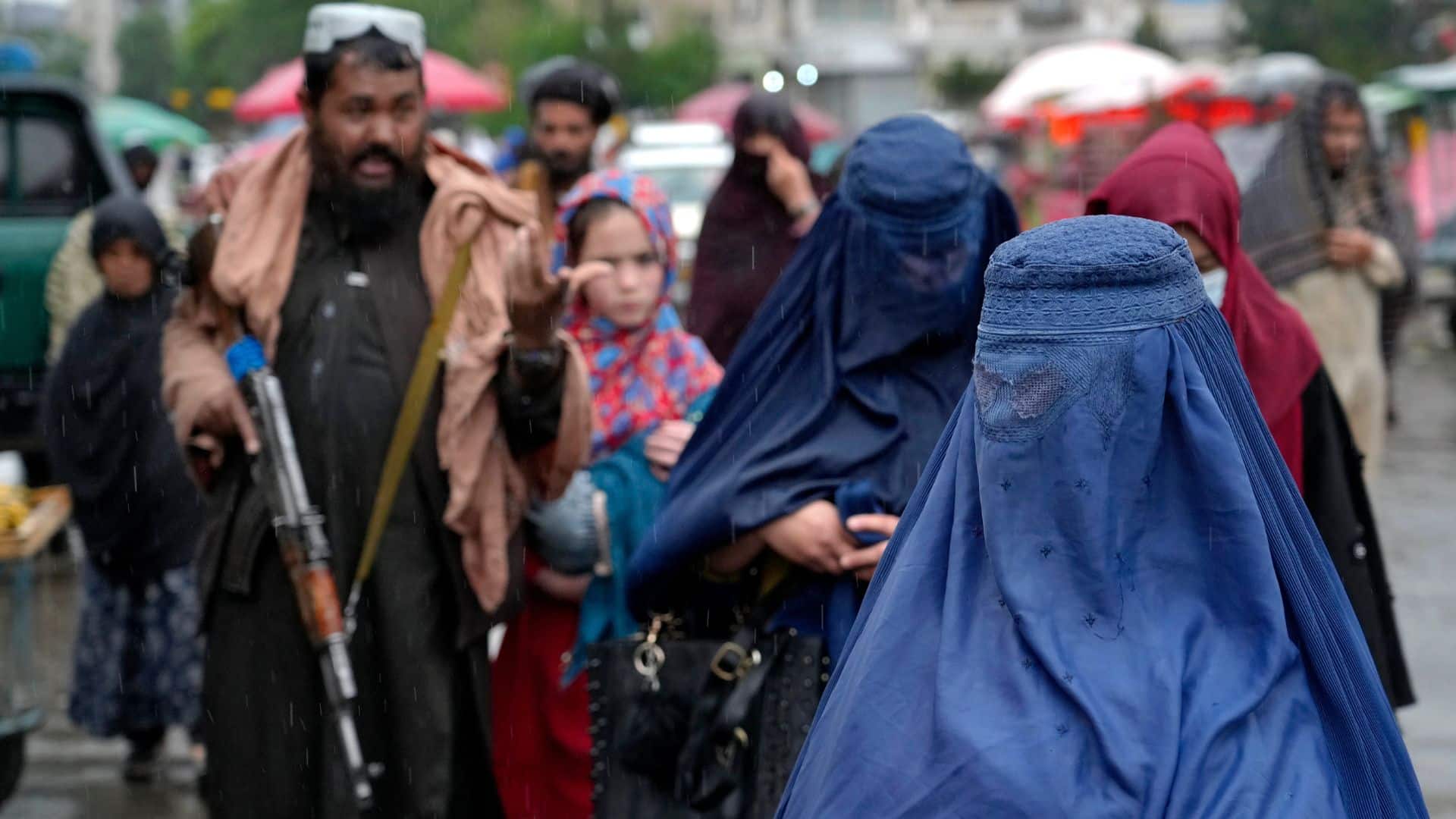Around the world, people are calling for the Taliban’s acts against women to be considered apartheid. Is how the world determines inequality itself unequal?

Afghan women walk through the old market as a Taliban fighter stands guard in downtown Kabul, Afghanistan. Taliban rulers on 7 May 2021 ordered all Afghan women to wear head-to-toe clothing in public. (AP Photo/Ebrahim Noroozi)
This article was produced exclusively for News Decoder’s global news service. It is through articles like this that News Decoder strives to provide context to complex global events and issues and teach global awareness through the lens of journalism. Learn how you can incorporate our resources and services into your classroom or educational program.
After the Taliban regained power in Afghanistan in August 2021, Tamna Zaryab Pariyani began protesting on the streets of Kabul against restrictions the Taliban imposed on women and girls. On 29 December 2021, the Taliban arrested the civil rights activist along with four of her sisters. After spending 26 days in prison, they fled to Germany.
For 12 days in September, Pariyani and 16 other civil activists from Afghanistan went on a hunger strike. After their protest, other activists inside and outside of Afghanistan continued what they started.
They are calling on the world to recognize the actions against Pariyani and other women by the Taliban — the fundamentalist Islamic group that controls the country — as gender apartheid. It is the latest action in a worldwide movement to equate discrimination of women as with discrimination against ethnic or religious groups.
In March 2023, a group of respected Iranian and Afghan women, including Iranian Nobel peace prize laureate Shirin Ebad, signed an open letter calling for gender apartheid to be a crime under international law.
Back in 1976, the International Convention on the Suppression and Punishment of the Crime of Apartheid (ICSPCA), convened by the United Nations General Assembly, declared racial apartheid to be a crime against humanity.
Speaking out on behalf of women who can’t
When the United Nations General Assembly met on 19 September in New York, the representatives of most of the countries of the world asked for greater support of Afghan women.
On 26 September, the United Nations Human Rights Council held a special meeting on the rights of women in Afghanistan in response to successive protests by civil activists inside and outside Afghanistan.
In this meeting, the representatives of different countries condemned systematic discrimination, gender segregation and exclusion of women and girls in Afghanistan.
But while the United States, UK, France, Japan, Brazil, Switzerland, United Arab Emirates, Albania, Ecuador, Gabon and Malta issued a joint statement that called on the world to take effective steps to end the sexual harassment of Afghan women, the statement did not declare these acts gender apartheid.
The term “gender apartheid” dates back to the previous rule of the Taliban in Afghanistan, when the human rights group Amnesty International began using it to describe the treatment of women there.
Is discrimination of women different?
Political analyst Abdullah Khenjani is the former head of television and deputy minister of peace in Afghanistan and now resides in the UK. He said that the main characteristics of gender apartheid are segregation, discrimination, limited access, unequal legal rights, social norms, violence and harassment, lack of representation, limited mobility and economic disparities, often justified by cultural and religious beliefs.
“The Taliban’s restrictive policies, based on their tribal and misogynistic interpretation of religion, embody all the characteristics of gender apartheid towards women in Afghanistan,” Khenjani said. “The Taliban segregated men and women in society, categorizing women as inferior based on their gender, and used the power of the state and institutions to implement systematic bias and unequal treatment.”
Khenjani said that the Taliban also limited women’s equal access to resources, services, and opportunities, such as education and economic participation.
When women have no legal recourse
More importantly, Khenjani said, the Taliban’s leadership consistently issued draconian orders that limited the legal system’s ability to secure equal protection based on gender differences. Moreover, they actively shaped society to enforce the acceptance of traditional gender roles, which severely restricted individuals’ freedom of choice — a key element of the Taliban’s anti-women strategy.
Furthermore, the normalization of high-level gender-based violence, such as domestic violence and sexual harassment, with impunity, is a common practice under the Taliban regime, he said.
“The lack of meaningful representation and the denial of women in positions of power and decision-making processes are additional forms of gender apartheid practiced by the Taliban,” Khenjani said. “The restrictions on mobility and the economic impact on women-run businesses, such as closing beauty parlors, are key examples of gender apartheid under the Taliban regime.”
United Nations experts have determined that 130 million girls around the world are deprived of education, but Afghanistan is the only country where women and girls are prohibited from studying past the primary school level. According to the statistics of the United Nations Children’s Fund (UNICEF), 3.7 million children in Afghanistan are out of school and about 60% of them are girls.
After regaining power, the Taliban first banned girls from going to school. Day by day, they continued their restrictions against women and forbade women from studying in universities, working in private and government offices, going to beauty salons and going to parks. Women who protested in Afghanistan for their rights were arrested by the Taliban and taken to prison.
These include Neda Parwani and Julia Parsi, two civil activists who lived in Kabul. They both repeatedly protested against the decisions of the Taliban. Recently, both of them were arrested by the Taliban in Kabul and are currently in prison.
questions to consider:
- What is gender apartheid?
- Why do you think some governments are opposed to making discrimination against women an international crime?
- Do you think religion should be a justifiable reason to treat people differently according to the law? Why?

Rafiullah Nikzad is a former reporter with Khurshid TV in Kabul and has also reported for Voice Independent London. Through journalism, he wants to portray the truths of the society and stop oppression and injustice.
Check out more News Decoder stories about Afghanistan:
